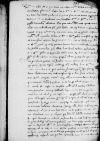Letter #1575
[Ioannes DANTISCUS] to [Mauritius FERBER]Cracow (Kraków), 1537-01-22
English register: Dantiscus is replying to three letters from Ferber. He thanks him for the news that the Warmia Chapter has elected him Ferber’s coadjutor with succession rights, and for helping him obtain this coadjutorship. He promises that upon returning (from the Diet) he will fulfill Ferber’s request concerning the election capitulations. Dantiscus informs Ferber that the provost (Paweł Płotowski) joined the Prussian gentry’s legation at the Diet. Płotowski intends to become a bishop with the gentry’s help. Wojciech Kijewski is this legation’s secretary. Johann von Werden is to inform Ferber about the speeches of Kijewski and Płotowski, which run counter to the interests of the Warmia and Chełmno dioceses. Dantiscus recounts his activities during the Diet. At the meeting of the Royal Council which he attended, the demands of the Prussian gentry were read to the king; these contradicted the promises made at the last assembly in Elbląg. The Prussian gentry’s envoys demanded from the king that he consult them when appointing lay and church officials in Prussia. After the demands were read, the king ordered that Dantiscus receive the Prussian gentry’s envoys the next day at his inn and try to reach an agreement with them. At a meeting on matters concerning Count Otto Heinrich (Wittelsbach), Dantiscus told the king in a direct conversation in German that the attempts had been to no avail. During this conversation the king strongly opposed the gentry’s demands, so Dantiscus is optimistic, despite the support that the gentry have from the queen and the Cracow voivode (Piotr Kmita). The king has entrusted Dantiscus with negotiating the issue of small towns with the Prussian gentry’s legation. The date of the swearing-in of the young king (Sigismund II Augustus) is not known yet. Some doubt whether it will take place at all. Waiting for this ceremony is the only reason why Dantiscus has remained in Cracow, as he has already spent 800 marcae. He will soon send Ferber a more extensive letter.
Manuscript sources:
Prints:
| ||||||||||||||||
Text & apparatus & commentary Plain text Text & commentary Text & apparatus Excerpts concerning Dantiscus' travels
Reverendissime in Christo Pater et Domine, Domine mi observandissime. Salutem et mei commendationem plurimam.
Accepi hic a Dominatione Vestra Reverendissima cf.
 BCz, 242, p. 186
actum, neque hic agi posse, cum
BCz, 242, p. 186
actum, neque hic agi posse, cum
ms 1 totu[m] paper damaged⌈totumms 2 3 4 totum,
ms 1 totu[m] paper damaged⌉
ms 1 pungente[s] paper damaged⌈pungentesms 2 3 4 pungentes,
ms 1 pungente[s] paper damaged⌉, ne scilicet
ms 1 [ea] paper damaged⌈eams 2 3 4 ea,
ms 1 [ea] paper damaged⌉
ms 1 n(i)ch[ts]⌈n(i)chtsms 2 n(i)chts,
ms 1 n(i)ch[ts]⌉ doraus[8], cum quodam haec dicens in illos stomacho, unde bona nos spes habet, quod eorum conatus, quantumvis
ms 1 negoti[um] paper damaged⌈negotiumms 2 3 4 negotium,
ms 1 negoti[um] paper damaged⌉ parvarum civitatum cum illis tractandum nobis commiserit, dabimus operam, si aliquam inter nos compositionem facere possemus etc.
Quando
ms 1 iuni[or] paper damaged⌈iuniorms 2 3 4 iunior,
ms 1 iuni[or] paper damaged⌉

